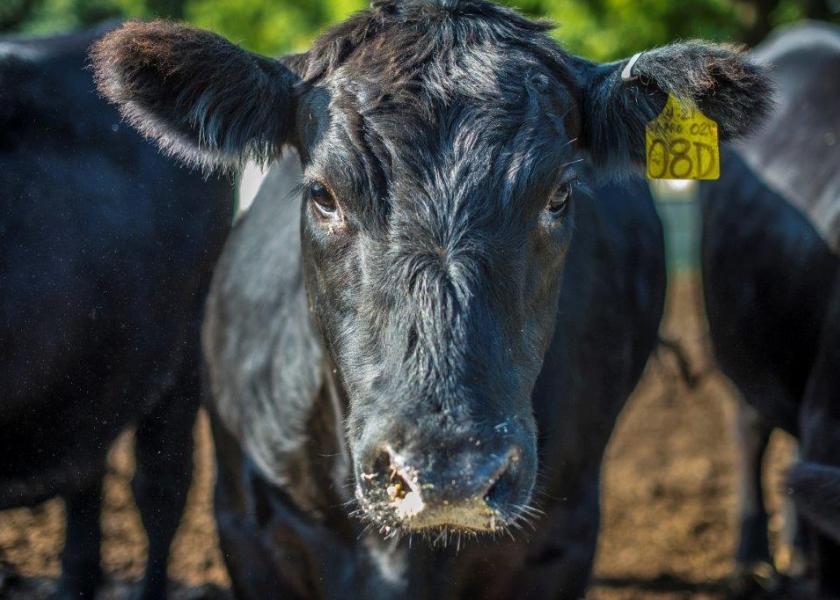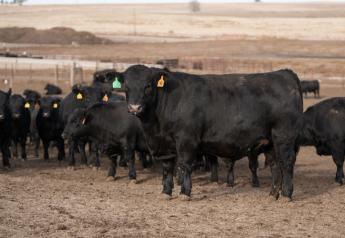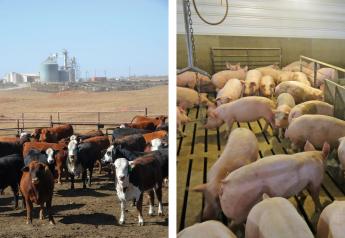Checkoff War May Impact Entire Agriculture Industry

A checkoff war has farmers and livestock producers caught in the crossfire. USDA, public records laws, redirection, and decertification are snagged in a Gordian knot, and the tangle may impact the entire agriculture industry.
What began as a dispute between the Ranchers-Cattlemen Action Legal Fund (R-CALF) and USDA over labeling and the use of checkoff dollars has become the flashpoint for a dumpster fire of heavyweight issues that could significantly affect the foundation of the beef and soybean checkoff system.
“If you are involved in any way with a federal or state checkoff, pay attention to what is happening in the world of checkoffs,” says Harrison Pittman, director of the National Agricultural Law Center. He describes the dispute as a “merry-go-round,” with only a few pieces visible from any single vantage point. Despite the complication, Pittman says the main focus should be on R-CALF litigation, legality and scope of redirection, decertification of state beef councils and soybean boards, and implications of the Freedom of Information Act (FOIA).
First Blood
Under the national beef checkoff, producers are required to pay a dollar-per-head assessment for every head of cattle sold. The assessments are usually collected by qualified state beef councils (QSBCs) that remit half the assessment to the Cattlemen’s Beef Board (CBB) and retain the remaining half for authorized promotion, information and research activities.
On May 2, 2016, R-CALF filed suit against USDA in Montana federal district court, attacking the constitutionality of the Beef Program by claiming half of the federal assessment that stays with the Montana Beef Council (MBC) forces R-CALF to subsidize speech at a private council. Pared down, R-CALF said producers shouldn’t be forced to pay into a private group that engages in speech–generic promotion of beef–with which they disagree. USDA countered by contending MBC was engaged in government speech with no First Amendment conflict.

Roughly two months later (July 15), the Agricultural Marketing Service (AMS) threw redirection, a rule proposal intended to define the potential path of checkoff dollars, into the legal ring. Under redirection, the AMS proposal allows beef and soybean producers to channel dollars away from state beef councils and soybean boards and straight to national boards. (Citing pending litigation, AMS declined all FJ questions related to the R-CALF and USDA dispute.)
In an effort to protect itself with a government speech banner, MBC finalized a Memorandum of Understanding (MOU) with AMS on Dec. 22, 2016, allowing AMS unprecedented oversight of MBC’s use of checkoff funds, and deferring MBC authority to AMS.
Chaley Harney, executive director of MBC, says the MOU has resulted in enhanced oversight: “We’ve always had oversight and the MOU is certainly taking it to a new level, but we’re still following the Act and the Order, just like we always have been.”
“Why Are We Even Here?”
The R-CALF versus USDA fight continues to funnel through the court system. On April 9, the United States Court of Appeals for the Ninth Circuit, in a 2-1 vote, affirmed a lower court injunction against the use of checkoff funds at MBC without consent from rancher payees.
USDA can appeal the decision and can ask for an en banc review, which would call for a hearing from the entire bench of Ninth Circuit judges. If USDA doesn’t appeal, the case returns to federal district court and toward a final determination based on its merits. Arguments have already been made, but briefings will be required. R-CALF will use the Ninth Circuit decision to bolster its claims for the necessity of a permanent injunction.
Pittman believes the ultimate outcome may depend on whether the Ninth Circuit drills beneath both party’s arguments and examines the actual text of the Beef Act and Order. Both sides, and therefore the district court, may have incorrectly applied the law in the course of litigation, according to Pittman: “If the judges examine the Beef Act and Order, they may very well ask, ‘Why are we even here?’ and send this back to district court with instructions to dismiss or rule on certain issues not raised in the course of litigation, especially given the standard of review–abuse of discretion–the court will apply in this particular case. Of course, this argument could arise at the district court level as well when it takes the matter back up.”

Pittman contends the court may ask itself a question not raised by either party: Whether the MBC, like other QSBCs, is a government entity for First Amendment purposes. According to Pittman: “One could argue, and it’s an argument I happen to believe is a correct one to make, that QSBCs are expressly created by Congress to perform an exclusive, statutorily-prescribed function of promotion, research, and information and therefore are government entities for First Amendment purposes. If that’s the case, as implied in previous Ninth Circuit case law, then it’s highly likely that MBC’s speech is government speech.”
All QSBCs are created equally, including MBC, he continues: “The term qualified state beef council is created by Congress and federal statute. According to law, QSBCs appear to be government entities. Yet, nobody is arguing MBC is a government entity, a seminal issue to this entire case.”
In the same vein, Pittman addresses the “assumed legal reality” of decertification presented by USDA and R-CALF attorneys. He questions decertification’s definition, application and secrecy. Decertification of QSBCs is not explicitly addressed in the Beef Act or Order, and the way it is currently expressed raises additional statutory and constitutional issues that merit considerable attention, Pittman argues. “The attorneys for USDA and R-CALF seem to think the Beef Board gets to make the decision as to whether and when a state beef council is decertified, which, of course, gains significant financial benefit because the federal board would begin receiving the entire assessment. I question that and everything about decertification,” he says. “Given that decertification of a beef council or soybean board means all assessments in a given state are lost by the state and that it’s not expressly addressed in the Act or Order, it deserves much, much more clarification from USDA.”
Redirection Impossibility?
Pittman also points toward what he labels “major flaws and confusion” in redirection: “Both USDA and R-CALF seem to be saying that producer payments to state beef councils are purely voluntary rather than required. By the way the Beef Act, Beef Order, Soybean Act and Soybean Order are written, one could reasonably argue that the payments to state beef councils are required rather than voluntary and therefore redirection may not be legally permissible.”

The language of both acts and orders raises an issue as to whether redirection is even possible. If producers, purchasers, state boards and councils comply with the express language of the acts and orders, the process always concludes with the state entities retaining half, or more, of the assessment, Pittman describes. “There can be no checkoff program without funds and Congress and USDA specifically laid out a process for how the assessments would flow and who would control those funds from the producer to the purchaser, to the state councils and boards who physically retain and expend at least half of the original assessment before remitting the remaining amount to the federal boards.”
Scott Stuart, CEO of the Beef Board, disagrees with Pittman and says redirection is permissible according to Beef Order language: “Yes, the Beef Order permits the redirection of assessments.”
Bill Bullard, CEO of R-CALF, believes the courts will rely on government deference for interpretation of statutes: “That’s why we came at this from a constitutional angle. It’s a violation of the First Amendment to compel producers to pay a tax to subsidize private speech. The Constitution is the governing document, as opposed to text in acts and orders.”
FOIA?

While not directly on the table in the R-CALF litigation, public records laws remain an underlying issue for state beef councils, soybean boards, and other federal checkoff programs. A complicated FOIA question could spring out of R-CALF-USDA litigation. If MBC is viewed by the court as a government entity, it is much more likely subject to FOIA. By extension, if MBC is a government entity, all councils and boards in the checkoff program could be viewed as government entities, also likely subject to FOIA. Many special interest, environmental and animal rights groups would be keen to slap FOIA requests on some state programs.
“State beef councils and soybean boards, as well as other federal research and promotion programs, are created by the feds and given specific regulatory and operating laws. Thus, they could very well be considered government entities for purposes of the First Amendment and therefore correspondingly subject to FOIA requests,” Pittman notes.
Stuart counters the FOIA argument and says the distribution of government speech is not germane to FOIA compliance. “The R-CALF litigation does not involve FOIA, and will not open state councils to FOIA requests. FOIA is a federal statute that applies to federal agencies. Whether an organization creates or distributes government speech is not relevant to whether that organization is an agency that is required to comply with FOIA,” he explains.
Joe Maxwell is the executive director of the Organization for Competitive Markets (OCM) and has been involved in a FOIA wrangle with USDA for five years over financial data related to the National Cattlemen’s Beef Association. He says FOIA is a major issue in the heart of the R-CALF litigation. “MBC or any state council can’t have it both ways. If MBC is engaged in private speech, then a producer has a right to direct funds away. If MBC is engaged in government speech, then MBC has to release all records to FOIA.”
Maxwell believes once a government banner hangs in the window, the entire shop is subject to FOIA. “We claim, counter to MBC, that QSBCs are recognized by USDA in the Order and are therefore government agencies and have to abide by rules of state and federal government. USDA is in a box and has woken up to that fact that one side of the box is FOIA and the other is redirection. They’re in a mess.”

USDA is worried about the effect of R-CALF litigation spreading to all state councils, according to Bullard: “I don’t have direct evidence, but I believe USDA is highly concerned. If we prevail, we’ll ask USDA to apply the decision nationwide. If USDA does not, we likely will file additional litigation. It would be the first time in 30 years producers get an open choice. They can do whatever they choose, but at least they’d have a choice.”
The checkoff system offers tremendous success and benefits to producers, insists Stuart: “Over 30 years ago, beef producers in the U.S. determined a Beef Checkoff to be in their best interest as evidenced by the overwhelming support for the program through a referendum held in 1988 during which all producers had the opportunity to either continue or discontinue the program.”
Everyone
The questions around FOIA, redirection, decertification and government entities will continue to fester, leaving state councils and other checkoffs with mounting questions, Pittman contends. “This case is going to impact state beef councils and soybean boards around the country. Everyone should be watching and that means farmers, industry, state ag departments, USDA, and the land grant university system. Everyone.”
For more from Pittman, see:
Soybean Checkoff Dollars & USDA “Redirection”: Compatible with Federal Law?
Beef Checkoff Dollars & USDA “Redirection”: Compatible with Federal Law?







